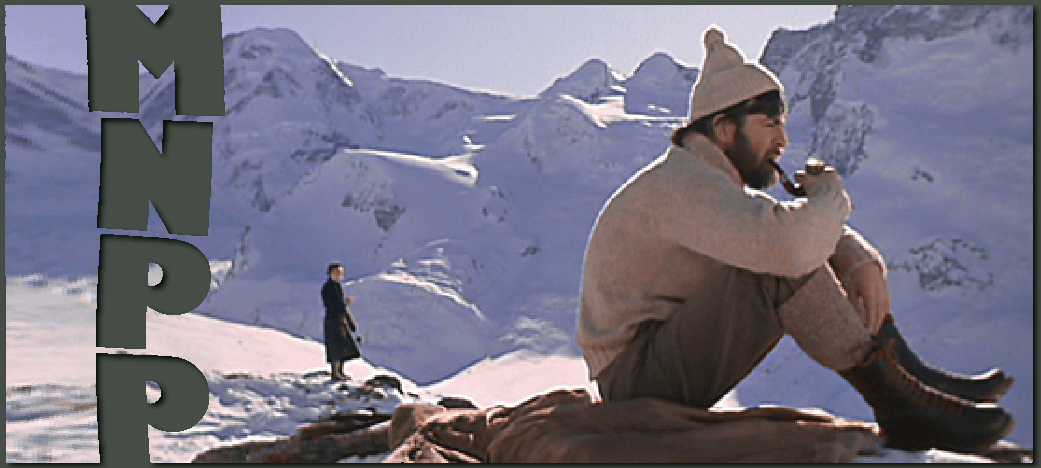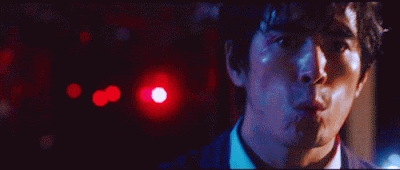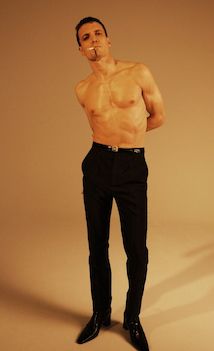.
(This will be the first review I start off by directly quoting my immediate post-screening tweet about it, but it's a good jumping off point, so... I am that person now. This is the world we live in!) I found Takashi Miike's Lesson of the Evil to be profoundly disturbing - now I just have to sort out how much of it is purposefully so. The thing is, I think this time around the answer is - most of it, really.
Miike makes too many movies for me to state anything about him conclusively - I only catch every third to fifth one, it seems - but the past several have had this wobbly kinda tone that I haven't been able to get a grasp on. Mind you, I haven't really felt as if Miike was unaware of this - smashing up tones into inappropriate and confounding arrangements is, basically, what he does. It's just that, in what I've seen, I haven't really gotten the point of the exercises lately. It's been a lot of silliness, outweighing much substance.
.
(This will be the first review I start off by directly quoting my immediate post-screening tweet about it, but it's a good jumping off point, so... I am that person now. This is the world we live in!) I found Takashi Miike's Lesson of the Evil to be profoundly disturbing - now I just have to sort out how much of it is purposefully so. The thing is, I think this time around the answer is - most of it, really.
Miike makes too many movies for me to state anything about him conclusively - I only catch every third to fifth one, it seems - but the past several have had this wobbly kinda tone that I haven't been able to get a grasp on. Mind you, I haven't really felt as if Miike was unaware of this - smashing up tones into inappropriate and confounding arrangements is, basically, what he does. It's just that, in what I've seen, I haven't really gotten the point of the exercises lately. It's been a lot of silliness, outweighing much substance.
.
And on the surface here, that might seem to be the case - there's all manner of wackiness up in Lesson of the Evil, be it a teacher whose main identifying feature is an inability to speak without excessive phlegm interrupting him, or a parent's buffoonish hollering played to the bleachers, or an extended battle of the wits with a pair of crows as if this is a Spy Vs Spy cartoon.
But the film ultimately struck me as most deadly serious affair. There's a point where the the loser teacher with the phlegm problem describes the main character - a beautiful popular secretly psychotic teacher named Hasumi played by the beautiful popular hopefully not secretively psychotic Hideaki Itô (a girl behind me actually moaned with lust when he first appeared on screen) - as someone who sparkles on the outside but inspires no jealousy, because there's no there there - if that sounds familiar, well the references to Mary Harron's American Psycho are often terribly explicit.
For one, the film spends a ton of time fetishising leading man Itô's physique, to much the same effect as Harron did with Bale in that film. (This is a movie that will feature prominently in next year's Gratuities, make no mistake.) He looks gorgeous, and the camera knows it - Miike keeps him near to naked as often as possible, with his lens trained to his every good angle (and goodness there are many many good angles).
Even the very first shot in the film is of his character's bared chest (albeit the teenage version of him, but then the film makes much mileage out of sexualizing teenagers). The characters are all in awe of his prettiness (save that one phlegmy teacher), which inures them to the deadness and the horror laying in wait behind it.
And around the time out psychopath is slipping into his see-through rain slicker to do some damage while some bee-boppy music throbs on the soundtrack, well the Patrick Bateman shout-out couldn't be any more clear.
Indeed there's even a character in the film besides Hasumi that could be read as Takashi Miike's explicit joke version of Patrick Bateman himself - Hasumi got his degree from Harvard and in flashback we meet Hasumi's "partner," a comically exaggerated American college boy slash psychopath who gets his kicks from, well, murders and executions. Later in the film this character becomes the voice in Hasumi's head (in an amusingly Cronenbergian way), prodding him to express more outward glee in his killings - indeed the film's arc could be read as just that: Hasumi needs to learn to love what he does, and Patrick Bateman is just the man to finally teach him how to put a skip in his step.
That arc can be read even on an aural level - the film's main theme song is "Mack the Knife," and that song's evolution from a German threepenny opera tune written by Bertolt Brecht to the pop standard it became thirty years later up until the current day, is an actual plot point referenced in the film itself. At the start Hasumi's derangement is scored to the original version, all eerie German spareness and horror, but as he becomes the man he's meant to be, the sing-songy paragon of butchery, the song too transforms into its poppy Americanized double. It's a brillaint choice of song, really - has there been a creepier pop song ever? "Though the shark's teeth may be lethal / Still you see them white and red / But you won't see Mackie's flick knife / Cause he slashed you and you're dead." Indeed.
I think a critique of American culture and its influence on Japanese culture could actually be read into the film - Hasumi is the English teacher at the high school and is seen speaking English all the time (especially at oh let's say inopportune moments). And in the same sequence where we get his Harvard flashback we get a truly bizarre scene where we see Hasumi's time spent in the banking industry in America - making him an ex-banker further connects him to the Patrick Bateman School of Financial Bloodshed, giving it that extra goose of corporate soullessness - that's played part comic book, part noir, all one hundred percent weirdness. And it ends with him being banned from ever returning to the USA, forcing him to bring his insanity back home to Japan.
It should be pointed out that Hasumi's ultimate weapon of choice is a gun, which if I might paint with broad strokes for a moment, is more of an American problem than a Japanese one. I know there are examples you can point to that prove this less than pure fact, but I don't think I'm writing this from a blindered point of view - High School shooting rampages are (sadly, horrifically) as American as apple pie. I think it's hardly trivial that Hasumi's gun grows an eyeball and starts telling him what to do with Patrick Bateman's voice. (Not that such a thing could ever be thought of a "trivial" of course, but you get my point.)
.
But the film ultimately struck me as most deadly serious affair. There's a point where the the loser teacher with the phlegm problem describes the main character - a beautiful popular secretly psychotic teacher named Hasumi played by the beautiful popular hopefully not secretively psychotic Hideaki Itô (a girl behind me actually moaned with lust when he first appeared on screen) - as someone who sparkles on the outside but inspires no jealousy, because there's no there there - if that sounds familiar, well the references to Mary Harron's American Psycho are often terribly explicit.
For one, the film spends a ton of time fetishising leading man Itô's physique, to much the same effect as Harron did with Bale in that film. (This is a movie that will feature prominently in next year's Gratuities, make no mistake.) He looks gorgeous, and the camera knows it - Miike keeps him near to naked as often as possible, with his lens trained to his every good angle (and goodness there are many many good angles).
Even the very first shot in the film is of his character's bared chest (albeit the teenage version of him, but then the film makes much mileage out of sexualizing teenagers). The characters are all in awe of his prettiness (save that one phlegmy teacher), which inures them to the deadness and the horror laying in wait behind it.
And around the time out psychopath is slipping into his see-through rain slicker to do some damage while some bee-boppy music throbs on the soundtrack, well the Patrick Bateman shout-out couldn't be any more clear.
Indeed there's even a character in the film besides Hasumi that could be read as Takashi Miike's explicit joke version of Patrick Bateman himself - Hasumi got his degree from Harvard and in flashback we meet Hasumi's "partner," a comically exaggerated American college boy slash psychopath who gets his kicks from, well, murders and executions. Later in the film this character becomes the voice in Hasumi's head (in an amusingly Cronenbergian way), prodding him to express more outward glee in his killings - indeed the film's arc could be read as just that: Hasumi needs to learn to love what he does, and Patrick Bateman is just the man to finally teach him how to put a skip in his step.
That arc can be read even on an aural level - the film's main theme song is "Mack the Knife," and that song's evolution from a German threepenny opera tune written by Bertolt Brecht to the pop standard it became thirty years later up until the current day, is an actual plot point referenced in the film itself. At the start Hasumi's derangement is scored to the original version, all eerie German spareness and horror, but as he becomes the man he's meant to be, the sing-songy paragon of butchery, the song too transforms into its poppy Americanized double. It's a brillaint choice of song, really - has there been a creepier pop song ever? "Though the shark's teeth may be lethal / Still you see them white and red / But you won't see Mackie's flick knife / Cause he slashed you and you're dead." Indeed.
I think a critique of American culture and its influence on Japanese culture could actually be read into the film - Hasumi is the English teacher at the high school and is seen speaking English all the time (especially at oh let's say inopportune moments). And in the same sequence where we get his Harvard flashback we get a truly bizarre scene where we see Hasumi's time spent in the banking industry in America - making him an ex-banker further connects him to the Patrick Bateman School of Financial Bloodshed, giving it that extra goose of corporate soullessness - that's played part comic book, part noir, all one hundred percent weirdness. And it ends with him being banned from ever returning to the USA, forcing him to bring his insanity back home to Japan.
It should be pointed out that Hasumi's ultimate weapon of choice is a gun, which if I might paint with broad strokes for a moment, is more of an American problem than a Japanese one. I know there are examples you can point to that prove this less than pure fact, but I don't think I'm writing this from a blindered point of view - High School shooting rampages are (sadly, horrifically) as American as apple pie. I think it's hardly trivial that Hasumi's gun grows an eyeball and starts telling him what to do with Patrick Bateman's voice. (Not that such a thing could ever be thought of a "trivial" of course, but you get my point.)
.
But let's go back to the film's tonal wonkiness, which I think ultimately works - and tremendously so - in Miike's favor this time around. Remember the last few scenes of American Psycho, where Bateman is trying to cram cute little kittens into ATM machines and shooting little old ladies while the world explodes? This movie is a lot of that, multiplied out. There was a lot of laughter at last night's screening, which I suppose is one way to watch it, but it was definitely one of those times for me when every audience snicker made me even more uncomfortable...
.
.
... and yet I think Miike knew what he was doing. Even though the audience tried to keep up their laughter, as the slaughter droned on and on and we watched student after student die horrifically in an explosion of red, I think I sensed a pretty strong turn in the room. At least personally I found myself becoming horrifically unsettled by what I was looking at, and I realized that Miike kept setting up the jokes only to slash the throats of his every punchline. Miike likes these kids, and he gets us to like these kids, and even as Hasumi is finding his jazzy rhythm all of the kids deaths are played not like jokes but like absolutely brutal horrors.
It's one of the trickiest balancing acts I've seen attempted on-screen in a long while, and judging from the audience around me I'm honestly not totally sure how much of it I'm projecting onto it... this movie, if it were the sort of thing that'd ever get released here in the US, would make a lot of people very very angry. Hell it made me angry, and sick - I just think that Miike actually honest to goodness intended it to. It's not as finely calibrated as Harron's masterpiece but then it doesn't have to be - Miike
turns a wobbliness of tone into a true asset. He keeps you guessing
what the hell you're supposed to be thinking about what you're seeing
right up to the end, and he uses that to craft a deeply unsettling experience. It's the picture of perfect insanity.
.















































1 comment:
Dammit - I really wanted to see this last night and just couldn't make it. Great review.
Post a Comment